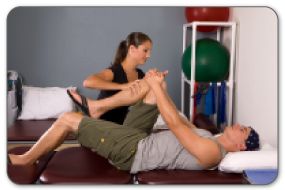There are several tendons in the hip area that attach the muscles to hip bones to stabilize the joint and control hip and leg movements. Tendons are non-elastic connective tissue, which tend to become brittle with age or overuse. Tendons can be injured with repetitive use, when the hip takes a blow, or can result from old injuries that have not properly healed. The tendons in the hip can be especially prone to injury in athletes or people who work or take part in an activity that repeats one action over and over.

Some of the most commonly injured tendons in the hip are the iliopsoas tendon, iliotibial band tendon (IT band), and the ischial tendon, but injury to any of the hip tendons are possible. The most commonly injured tendon of these is the iliotibial band. It runs from the iliac crest (crest of the pelvis) down the side of the leg and hip, and inserts at the upper tibia (top of the knee). When this IT band is injured it is called iliotibial band syndrome, or ITBS.
Tendon injuries in the hip can range from a mild strain to a full rupture. Other soft tissue damage in the immediate area may also occur with a tendon injury. Unfortunately, tendons by nature receive very little blood flow. This prevents certain areas of the tendons from getting adequate oxygen and nutrients necessary to repair themselves.
A hip tendon strain that is left untreated can easily worsen and start to cause other soft tissue injuries via overcompensation or conditions related to tendonitis such as bursitis or tendinosis (which is basically chronic tendonitis). Chronic tendonitis is a degenerative condition in the tendon fibres that generally causes severe, burning pain in the area, thickening of the tendon and gradual weakening which is exacerbated by frequent stress on the tendon as seen in repetitive strain cases.
A tendon can be strained to varying degrees depending on the force that caused the strain and the strength of the tendon tissue. There are 3 difference grades of tendon strains and the grade is determined by the severity of the tissue damage.
A grade 1 strain is the least serious of hip tendon strains. With a grade 1 strain there is some stretching of the tendon tissue. These injuries usually heal quickly if treated properly.
A tendon strain can easily be treated with conservative treatments (including RICE - rest,ice,compression,elevation) to improve the health of the tendon and restore the elasticity to reduce the risk of restraining it again.

A grade 2 strain occurs when a hip tendon is partially torn but still intact. If you have a grade 2 strain, strength in the tendon and attached muscles is noticeably reduced. Pain, swelling and inflammation will occur in the hip around the tear.
With this grade of strain, a physician will probably recommend that you follow a conservative treatment protocol for at least 6 weeks. It is very important that you follow instructions carefully and REALLY REST the area, as further strain could easily worsen the injury. If no progress is made, the physician or PT may opt for some form of surgery or further diagnostic testing.
When a hip tendon is completely torn (ruptured) it is considered a grade 3 tear. Hip stability is greatly reduced, pain is evident, and the range of motion is limited depending on which tendon is torn. Treatment of a complete tendon tear usually requires hip surgery to rejoin the tendon to the bone or tissue at the point of the tear.
Conservative treatment protocols are usually recommended prior to surgery, as doing so will minimize swelling/inflammation, resulting in a less invasive (destructive) surgery. To learn about post-hip surgery recovery, go to our Surgery Rehab page.
The treatment for hip tendonitis should focus on resting your hip and reducing inflammation to relieve pain.

PT can assist you in stretching the gluteus maximus tendon/muscle and IT band if they are tight. If the gluteus maximus tendon or iliotibial tract have thickened, frayed and/or become inflamed you can treat the injury with home conservative treatment methods to try and deal with tough connective tissue such as tendons, muscles and ligaments. Once swelling is reduced with application of a Cold Compress or Ice Pack, treating the area with a Back/Hip TShellz Wrap® will help induce an increase in blood flow while also temporarily increasing the flexibility of soft tissue in the area. This should help alleviate the symptoms of muscle strain quite quickly as the tissue receives good blood supply and the warmth increases elasticity and flexibility. In most cases, utilizing home conservative treatments such as a Cold Compress or Ice Pack and the TShellz Wrap®, combined with rest and a stretching regimen will help or -at minimum- reduce risk of worsening soft tissue damage in the hip.
To learn more about conservative treatments for the hip, go here.
However, words are meaningless unless a company stands strongly behind the products they sell. This is what sets us apart from others...we offer people a comprehensive, 60 day, full 100% money back guarantee. We take on all of the risk because we know our products work well for the overwhelming majority of people who purchase them.
Click HERE to Go To Our Online Store We take all major credit cards and Paypal.
If you have questions, call our office at 1-866-237-9608 (toll free continental US).
We are currently offering FREE SHIPPING and a 60 day trial period on all our Wraps.
Product Advisors are available 9:00 am to 5:00 pm Eastern Standard Time Monday to Friday.
I want to learn more about Hip Surgery & Post-Surgery Recovery
I want to learn more about Circulation Boost
I want to learn more about Ice & Heat: Which Is Better For The Hip?
I want to learn more about Trigger Points in the Hip
I want to learn more about Hip Surgery: Do I Need It?
During your recovery, you will probably have to modify and/or eliminate any activities that cause pain or discomfort at the location of your soft tissue injury until the pain and inflammation settle. The more diligent you are with your treatment and rehabilitation, the faster you will see successful results!
Please be aware that this information is neither intended nor implied to be a substitute for professional medical advice. CALL YOUR HEALTHCARE PROVIDER IMMEDIATELY IF YOU THINK YOU MAY HAVE A MEDICAL EMERGENCY. Always seek the advice of your physician or other qualified health provider before using any of our outstanding products to make sure they are right for you and your condition or if you have any questions regarding a medical condition. Always see your doctor for a proper diagnosis as there are often many injuries and conditions (some very serious) that could be the cause of your pain.
© 2025 In.Genu Design Group, Inc. Contact Us